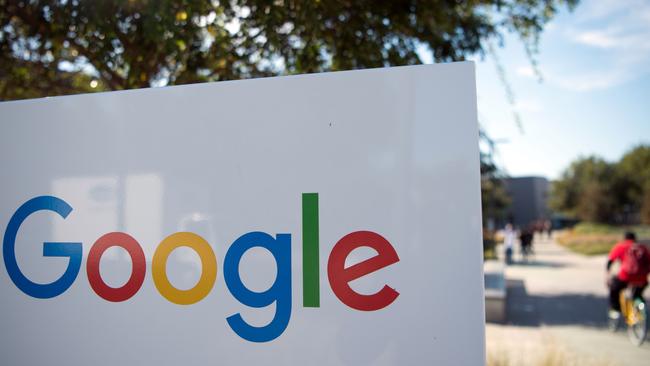‘More to come’, ACCC chief Rod Sims warns Google
Tech giants like Google can expect more Federal Court action in the months to come, says Australia’s competition tsar.

Tech giants including Google can expect more Federal Court action in the months to come, according to Australia’s competition tsar Rod Sims, who is taking on Google for allegedly taking user data without proper consent.
On Monday the ACCC launched blockbuster Federal Court action against Google, alleging the company misled Australian consumers to obtain their consent to expand the scope of personal information that Google could collect and combine about consumers’ internet activity.
The Federal Court action, if it goes to trial, is expected to be closely watched around the world by both regulators and technology companies.
The alleged behaviour affects millions of Australians with Google accounts.
“This could well set a precedent internationally,” Mr Sims told The Australian on Monday. “This is certainly going to trial, there‘s no doubt about that.”
Mr Sims said that the ACCC decided to take action after learning during its digital platforms inquiry the sheer size and scale of sensitive information Google was hoovering up about its users.
He foreshadowed more action against the tech giants.
“Since we‘ve been working on this, we’ve had more issues coming up,” he said. “And we’ll make judgments about when issues we see, either under competition law or consumer law, where we think there’s real harm and where we think they matter, it’s fair to say there’ll be more.
“I can‘t give you the timing of those and I can’t tell you how many, but where we think it’s important we’ll certainly be taking on more matters.”
In its filing the ACCC alleges Google misled consumers when it failed to properly inform consumers, and did not gain their explicit informed consent, about its move in 2016 to start combining personal information in consumers’ Google accounts with information about those individuals’ activities on non-Google sites that used Google technology to display ads.
This meant this data about users’ non-Google online activity became linked to their names and other identifying information held by Google. Previously, this information had been kept separately from users’ Google accounts, meaning the data was not linked to an individual user.
“We are taking this action because we consider Google misled Australian consumers about what it planned to do with large amounts of their personal information, including internet activity on websites not connected to Google,” Mr Sims said.
“Google significantly increased the scope of information it collected about consumers on a personally identifiable basis. This included potentially very sensitive and private information about their activities on third party websites. It then used this information to serve up highly targeted advertisements without consumers’ express informed consent.
“We allege that Google did not obtain explicit consent from consumers to take this step.
“The use of this new combined information allowed Google to increase significantly the value of its advertising products, from which it generated much higher profits. The ACCC considers that consumers effectively pay for Google’s services with their data, so this change introduced by Google increased the “price” of Google’s services, without consumers’ knowledge.“
The alleged behaviour relates to an “I agree” pop-up from Google, from June 2016 until at least December 2018, in which users were prompted with information about how Google would use their data.
The ACCC alleges that the “I agree” notification was misleading, because consumers could not have properly understood the changes Google was making nor how their data would be used, and so did not – and could not – give informed consent.
“We believe that many consumers, if given an informed choice, may have refused Google permission to combine and use such a wide array of their personal information for Google’s own financial benefit,” Mr Sims said.
A Google spokesman said the company would defend its actions in court.
“In June 2016, we updated our ads system and associated user controls to match the way people use Google products: across many different devices,“ a Google spokesman told The Australian.
“The changes we made were optional and we asked users to consent via prominent and easy-to-understand notifications. If a user did not consent, their experience of our products and services remained unchanged. We have co-operated with the ACCC’s investigation into this matter.
“We strongly disagree with their allegations and intend to defend our position.”
Labor’s communications spokeswoman Michelle Rowland said, “anyone who has experienced that spooky feeling of being served targeted ads after browsing the internet should welcome moves by the ACCC to ensure that Australian law is being upheld, that it is fit for purpose and that consumers are being protected.
“Sometimes targeted advertising can be handy, but it can sometimes feel invasive. The main thing is that consumers understand and consent to how their data gets used.
“More broadly, it is healthy that we debate whether companies are providing meaningful information and controls to consumers when it comes to obtaining consent for the use of their personal information, including for advertising.”
The government was contacted for comment.



To join the conversation, please log in. Don't have an account? Register
Join the conversation, you are commenting as Logout